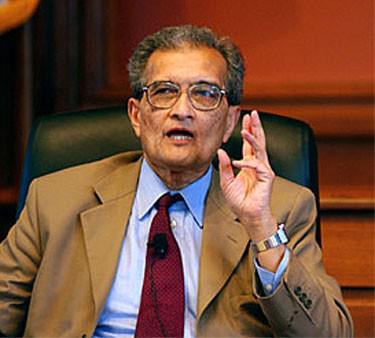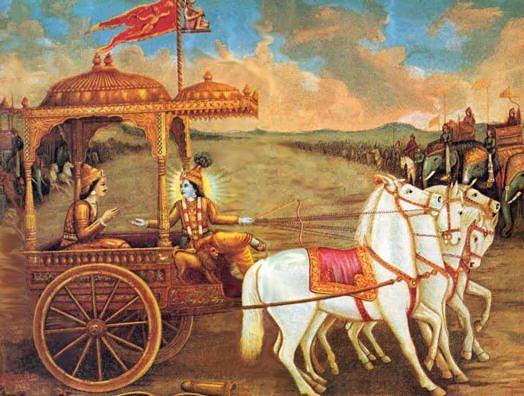
Well-Being
Well-being is the primary concern of the metaphysics emerging within the apparatus of electracy, to complement the concerns of the previous apparati (Orality = Religion, Right; Literacy = Science, Truth). Our project to invent an electrate Justiice functions within this concern. EmerAgency consulting as the means for this invention introduces Arts & Letters research on well-being into the public sphere in the context of democratic policy formation. In an EmerAgency konsult (whose form is Appiphany, as distinct from Scenario associated with scientific consulting), our point of departure specifies well-being in the terms formulated by Amartya Sen, winner of the 1998 Nobel Prize in Economics. A first step is to outline briefly Sen's thought-provoking vision, followed (in subsequent posts and topics) by a review of this vision in the context of contemporary art and philosophy.
The question for Sen concerns how a free democratic society measures the in/justice of its policies, relative to the well-being of individuals and communities affected. He admits that public reason (deliberative or practical reason) has its limits, but he insists that it is imperative to apply reason to problems to the extent possible. Referring to both the Enlightenment tradition in philosophy, and a tradition of jurisprudence in his native India, Sen identifies two overall approaches to social justice (each identified by the Indian terms): niti -- organizational or institutional propriety and ideals; nyaya -- the actual lives that people are able to lead. The philosophical division is between contractual approaches (Hobbes, Rousseau) or comparative approaches (Bentham, Marx).
What recommends Sen's vision for us is his focus on capability or capacity. Well-being, quality of life, is relative to an ability (power) to reason and choose, with freedom to decide according to one's values and preferences, the kind of life (life-style) one lives. Every term in this summary statement is problematic in a positive sense, meaning that this vision helps organize our consultation. Sen rejects the Kantian deontological ethics that judges according to principle, regardless of outcomes. Sen clarifies that his approach differs also from utilitarian wellfare economics, or approaches that center on resources, happiness, or fairness. He claims that examination of the actual lives people live suggests that the best measure of thriving is neither principles nor outcomes, not accomplishment or achievements, but conditions in which citizens have both the capability and the opportunity to act upon their preferences. One of his most telling points, made while observing the lack of correlation between the wealth of a society and its measurable happiness, is that there is precisely a capacity for happiness. An implication is that it might be useful to revise the United States Declaration of Independence to identify the inalienable right not as the "pursuit of" but "capacity for" happiness. Sen's argument raises the possibility that a society or culture may be set up in a way that renders citizens incapable of satisfaction.
There are four terms structuring Sen's measure, constituting a dynamic tension: agency and freedom on one side; well-being and achievement on the other. As you might expect, Sen in his books qualifies and justifies his position fully, at least relative to the academic discourse within which he is working. Sen acknowledges that Martha Nussbaum noted the relevance of Aristotle's ethics to the capability approach, and this context is indeed the one that we will explore, by adding another pair of terms to Sen's dichotomy: potentiality/actuality. This context references the entire tradition of Western philosophy, from Aristotle to Deleuze, a tradition that has undergone a fundamental change in modernity: not only a change of epoch, but a change of apparatus.
See Amartya Sen, The Idea of Justice, Harvard University Press, 2009
Share this
Comments

Sen Mystory

Identity formation (individual and collective) is one of the three registers of an apparatus, invented just as much as are the technologies and institutional practices. The new identity experience of electracy is generating a collective subject. This collective subject is to electracy what self is to literacy or spirit to orality. Our approach to imagining and constructing this new subject is through the new functionality assigned to the term and history of avatar in digital culture. Gregory Ulmer devoted a book (Avatar Emergency) to this emergent experience. The Popcycle provides an analytical matrix for documenting your place with respect to avatar. The original avatar is a representative of the Hindu deity Vishnu, who descends into the world in a time of crisis. Avatar is the Sanskrit word descent.
Electrate subject appropriates the functionality of descent (avatar), to reoccupy the questions developed within religious metaphysics, to discover new answers relevant to electracy. Since the initiation into egency (electrate agency) is through the composition of a mystory, mapping your place in the popcycle, it is useful to apply the popcycle analytically to a figure such as Amartya Sen, especially in this context, given his Indian and Hindu background. Sen discusses the Bhagavad Gita in several of his books, which authorizes us to propose it as the document representing his historical Community. Sen's commentary takes a fresh look at the traditional tale. The circumstance is the beginning of a civil war. Arjuna, the hero warrior of one side, arrives at the battlefield in his chariot, driven by his closest friend, Krishna. Arjuna hesitates to give the command that will start the battle. He expresses his doubts to Krishna, who reveals himself at that moment as Avatar, god on earth. The Bhagavad Gita consists of Krishna's explanation of the metaphysics of that world order. Arjuna's duty (Dharma) as warrior is to fight, which includes much killing, but none of that is his concern, but rather is for the gods alone (death being an illusion). Such is ethos. Sen today takes Arjuna's side, against the deontological principle, to suggest that Arjuna was right to consider consequences. Krishna persuades Arjuna to fight. "But was Arjuna really mistaken?" Sen writes. "Why should we want only to 'fare forward' and not also 'fare well'?" (The Idea of Justice, 210).
Sen's rereading of a clasic of his civilization demonstrates the device Hans Blumenberg called reoccupation. Blumenberg demonstrated in his study of secularization in the West that a new epoch does not entirely abandon its former metaphysics, but reoccupies it: that most of the old questions are retained, while the old answers are deleted, to make way for new proposals. We will find this insight useful as part of our invention of electracy, including the reocupation of significant positions of orality and literacy, as generative templates for innovation.

Freedom and Identity
To continue with Amartya Sen's mystory, his Family story may be represented by an incident he repeated in several books.

"I end this list of illustrations with another that draws directly on a personal recollection from my own childhood. I was playing one afternoon - I must have been around ten or so - in the garden in our family home in the city of Dhaka, now the capital of Bangladesh, when a man came through the gate screaming pitifully and bleeding profusely; he had been knifed in the back. Those were the days of communal riots (with Hindus and Muslims killing each other), which preceded the independence and partitioning of India and Pakistan. The knifed man, called Kader Mia, was a Muslim daily laborer who had come for work in a neighboring house - for a tiny reward and had been knifed on the street by some communal thugs in our largely Hindu area. As I gave him water while also crying for help from adults in the house, and moments later, as he was rushed to the hospital by my father, Kader Mia went on telling us that his wife had told him not to go into a hostile area in such troubled times. But Kader Mia had to go out in search of work and a bit of earning because his family had nothing to eat. The penalty of his economic unfreedom turned out to be death, which occurred later on in the hospital.
The experience was devastating for me. It made me reflect, later on, on the terrible burden of narrowly defined identities, including those firmly based on communities and groups (I shall have occasion to discuss that issue in this book). But more immediately, it also pointed to the remarkable fact that economic unfreedom, in the form of extreme poverty, can make a person a helpless prey in the violation of other kinds of freedom. Kader Mia need not have come to a- hostile area in search of a little income in those terrible times had his family been able to survive without it. Economic unfreedom can breed social unfreedom, just as social or political unfreedom can also foster economic unfreedom." (Development as Freedom, 8).
The point Sen argues here and elsewhere, relevant to our project of identity invention and construction, is that identity is not destiny, and that persons belong to numerous categories of identity. He attributes many of the problems of violence today to the reification of just one identity category (ethicity, relgion, race, nationality). One implication of his argument concerns the obsolescence or even crudeness of the ideological categories existing within literate critique, along with the ideals and values relative to them. Such ideals, categories, and values are leftovers of literate metaphysics, universal forms, concepts, to be displace through supplementation in electracy. A further, more immediately practical point, is that Sen argues as an economist against the use of market measures alone to assess well-being or success of a society or state, in favor of an expanded field, a holistic assemblage of freedoms, requring a holistic category formation. This argument is one motivation for our project.
